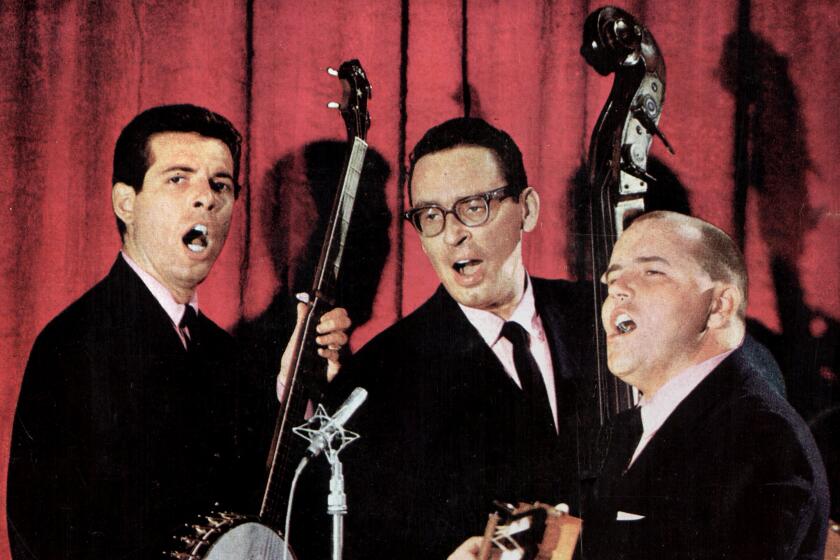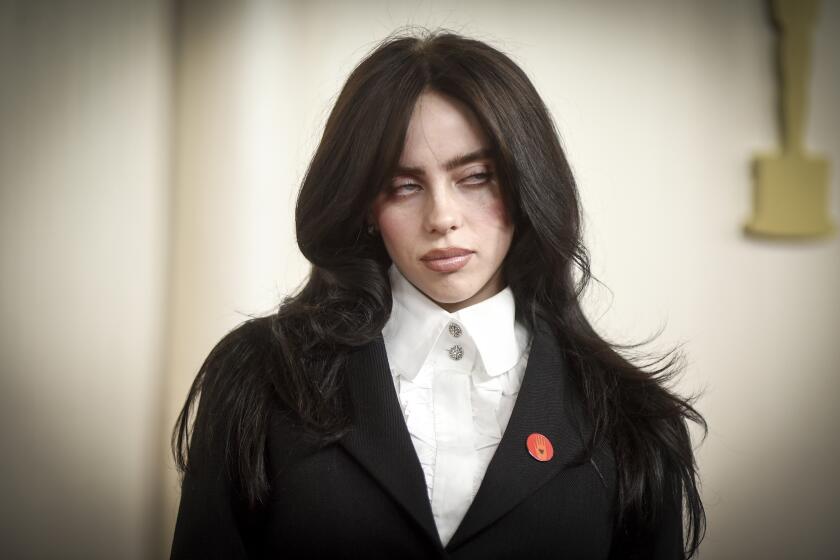California Sounds: New music from Neil Hamburger, Claude Fontaine and the Long Ryders
Neil Hamburger, “Still Dwelling” (Drag City).
The self-described “America’s Funnyman” hits it out of the proverbial ball park on his new album of orchestrated pop.
Hamburger, the gravelly voice has-been persona of the comedic actor, film critic and expert Gregg Turkington (“Ant-Man,” “Entertainment,” “The New On Cinema Oscar Special”), has over the years tackled country music on his enthusiastic album “Sings Country Winners” and gone for the soul market on his song “Endless Roll.”
Between coughs and grizzly throat-clearing, as a comedian Hamburger has made his name telling ridiculously bad jokes with telegraphed setups and cringe-inducing punch lines.

It’s all there in the video for “The Luckiest Man in this Room,” a bombastic big-band number that sees Hamburger inhabiting the body of a much suaver man than him, dancing amid women way too tasteful to give the real-life version much thought.
We watch Hamburger, who has a monthly residency at the Satellite in Silver Lake, bark and wail, lost in music as he vindictively addresses an adversary. “Tonight he won’t win — I coughed in his gin — with my sickness!”
While dancers spin and swing during one instrumental break, a series of boldfaced, all-caps words roll onto the screen. They read, “bankruptcy, divorce, tuberculosis.” Hamburger then glides back onto the stage with the losing-hand refrain: “Your luck has run out, my friend — a queen, a king and a 10!”
Elsewhere on “Still Dwelling,” Hamburger and big band — which mimics the grandiose 1960s work of producer Lee Hazlewood — move through a series of creepy, sad-sack songs. He covers rock band Heart’s “Crazy on You,” Sonny Curtis’ “The Straight Life,” Simon & Garfunkel’s “Homeward Bound” and American Music Club’s “Lonely.”
Claude Fontaine, “Cry for Another” (Innovative Leisure).
The Los Angeles-based singer and songwriter makes her stylistic intentions clear in the first song from her recently inked deal with Innovative Leisure. Called “Cry for Another,” it’s recorded as a straight-up rocksteady song that conjures the essence of Kingston, Jamaica, in the late 1960s.

The track is from a session at Kingsize Sound Labs, and from the opening rat-a-tat drumbeat the bona fides are on display. The song and video (shot at Valentine Studios in Studio City) feature musicians including guitarist Tony Chin, a founding member of the Jamaican studio group Soul Syndicate whose work can be heard on classic tracks by Augustus Pablo, Horace Andy and Tenor Saw. Bassist Ronnie McQueen drives the low end; he’s a founding member of Steel Pulse.
The Los Angeles-based Fontaine is preparing for the release of her debut album, one that advance notes describe as “a love song to classic reggae and Brazilian music, honoring that feeling of finding a home away from home.” A release date hasn’t been set but “Cry for Another” is a wonderful early warning. Fontaine will headline Zebulon in Frogtown on April 26.
The Long Ryders, “Psychedelic Country Soul” (Omnivore).
The title of the band’s first new album in 30 years is a pretty apt description of what lies within — and what defined the Long Ryders during their 1980s heyday.
Founded as the so-called Paisley Underground movement was drawing national attention via Los Angeles bands the Bangles, Green on Red, Rain Parade, the Dream Syndicate and others, the Long Ryders combined distorted post-punk guitars with road-tested twang.

Since their split in the late 1980s, the band has regrouped a number of times to perform and celebrate its legacy. Sid Griffin has issued records with his band the Coal Porters and written authoritative books on Bob Dylan and Gram Parsons.
In reuniting, Griffin said in a statement that “Psychedelic Country Rock” is “the album we were always trying to make.” Which is to say, it’s a tangle of country, folk-rock, soul and psychedelia. Featuring both rock songs (“The Sound,” “What the Eagle Sees”) and ballads (“Let it Fly,” “If You Want to See Me Cry”), the record sounds fantastic.
There’s a reason: the band reunited with producer Ed Stasium (Talking Heads, Motörhead, Smithereens), who captures with clarity the band’s dynamic textures (and the Bangles’ backing vocals). What arrives is an accomplished roots-music album that serves as a reminder of the band’s legacy.
For tips, records, snapshots and stories on Los Angeles music culture, follow Randall Roberts on Twitter and Instagram: @liledit. Email: randall.roberts@latimes.com.
More to Read
The biggest entertainment stories
Get our big stories about Hollywood, film, television, music, arts, culture and more right in your inbox as soon as they publish.
You may occasionally receive promotional content from the Los Angeles Times.







